The Toshiba OCZ TL100 is an entry-level, budget-friendly SSD first announced in September. Toshiba is positioning the SSD as an HDD replacement and touting benefits one would expect from an SSD over HDD. This includes dramatic improvement in boot times and overall performance, with lower power consumption resulting in longer battery life. The TL100 uses Toshiba’s TLC NAND flash memory technology, and has one of the lowest suggested retail prices on the market for an SSD.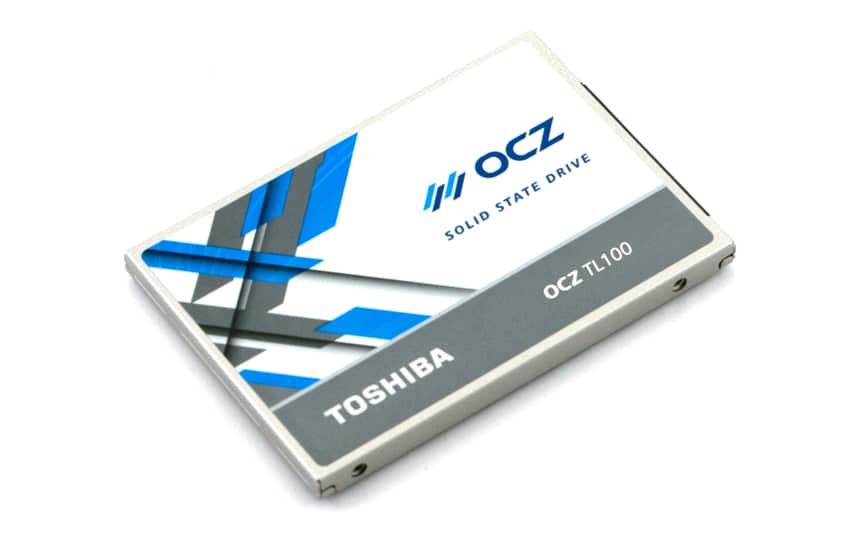
Toshiba is promoting the benefits of replacing an HDD with its new TL100 SSD instead of making claims against other value SSDs on the market. From a performance perspective, the company claims the TL100 can hit sequential reads up to 550MB/s and sequential writes up to 530MB/s. With random performance, the company is claiming the TL100 can hit 85K read and up to 80K IOPS write. The SSD comes in two capacities (120GB and 240GB) with total bytes written (TBW) of 30TB and 60TB, respectively.
The Toshiba OCZ TL100 SDD comes with a three-year warranty and starts for under $50 for the 120GB. Those who are interested can pick up the 240GB for about $68.
Toshiba OCZ TL100 SSD specifications
- Capacities: 120GB, 240GB
- NAND type: TLC
- Interface: SATA 6Gb/s
- Form factor: 2.5”, 7mm height
- Performance
- Sequential Read: Up to 550MB/s
- Sequential Write: Up to 530MB/s
- Random Read: Up to 85K IOPS
- Random Write: Up to 80K IOPS
- Endurance
- TBW:
- 240GB capacity: 60TB
- 120GB capacity: 30TB
- TBW:
- Environmental
- Operating Temperature: 0°C to 70°C
- Storage Temperature: -40°C to 85°C
- Shock Resistance: 14.7 km/s^2 {1500 G} (0.5 ms)
- Vibration: 196 m/s^2 {20 Grms} (Peak, 10 to 2,000 Hz)
- Certifications: CE, BSMI, RCM, KCM, UL, RoHS + RoHS2
- Physical
- Dimensions: 100 mm x 69.85 mm x 7.00 mm
- Weight: 37.5g
- Warranty: 3-year
Design and build
The Toshiba OCZ TL100 is a 2.5” SSD with a 7mm z-height and an aluminum case. The front of the drive has a sticker with the Toshiba OCZ branding. The rear of the case has another sticker with more information about the drive, such as capacity and model number.
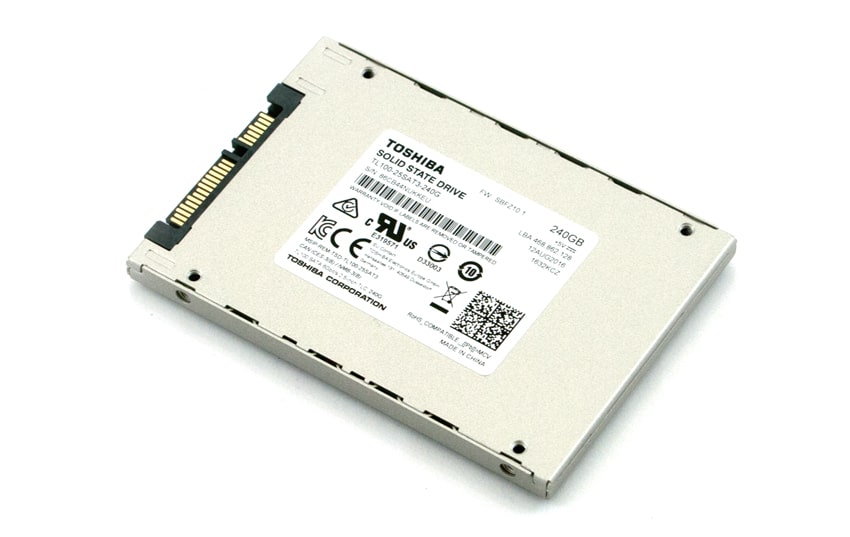
To open the drive up, one simply needs to pop the two parts of the case apart. The case is held together with tabs. On the top of the PCB, there are two NAND packs and a Toshiba controller.
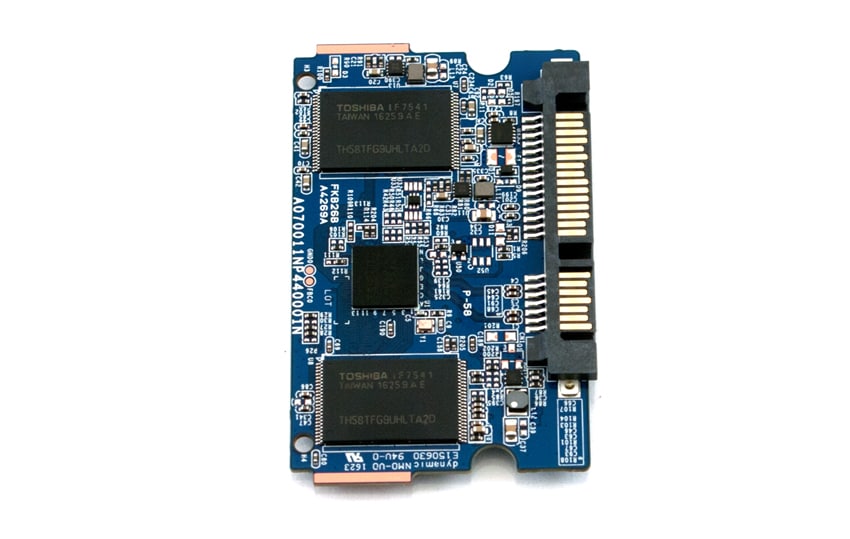
On the bottom of the PCB board, one can see two more NAND packs.
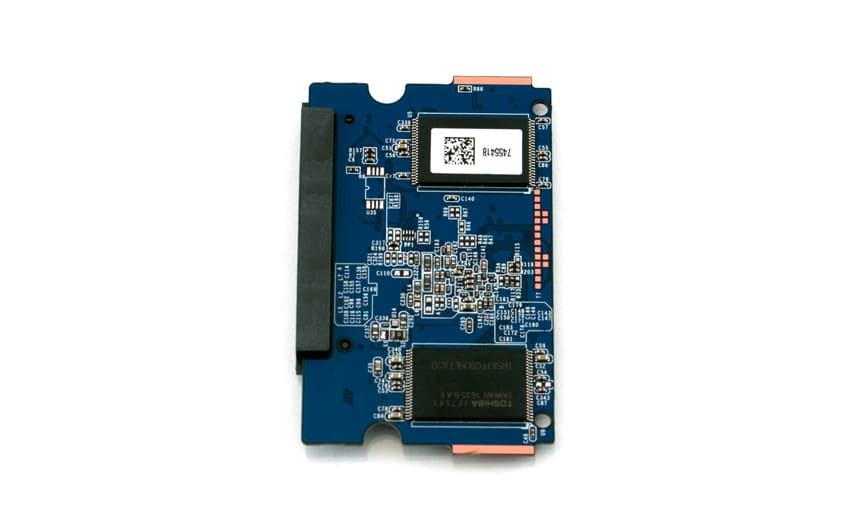
Consumer Synthetic Benchmarks
All consumer SSD benchmarks are conducted with the StorageReview HP Z640 Workstation. We compared the OCZ TL100 to the following drives:
- Samsung 850 EVO 1TB
- Samsung 850 EVO 2TB
- Crucial BX100 1TB
- Crucial BX200 480GB
- Crucial BX200 960GB
- OCZ Trion 150 960GB
- OCZ Trion 150 480GB
- Samsung 750 EVO 250GB
All IOMeter figures are represented as binary figures for MB/s speeds.
Our first test measures 2MB sequential performance. The TL100 performed a little less than average with read speeds of 473.67MB/s, and though not terribly far behind the leaders, it did score near the bottom of the pack we tested. The drive did a bit better with a write speed of 440.38MB/s. With write, the drive performed slightly above median.
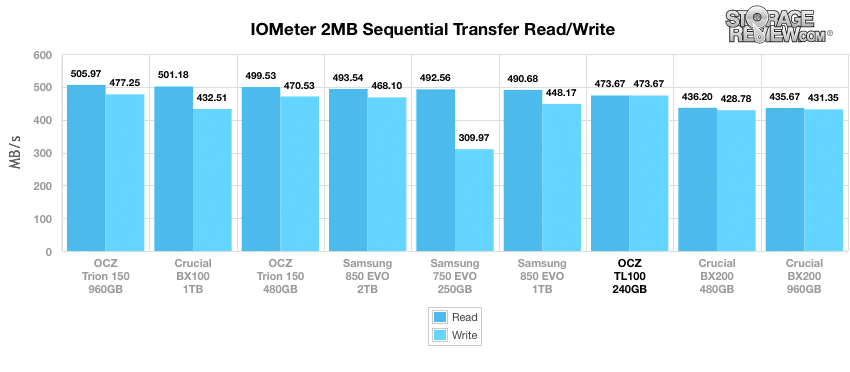
Moving to our 2MB random transfer performance, the TL100 showed similar placing, doing a bit better in placement with reads (414.12MB/s or sixth overall) and a bit lower with writes (304.77MB/s or fifth overall).
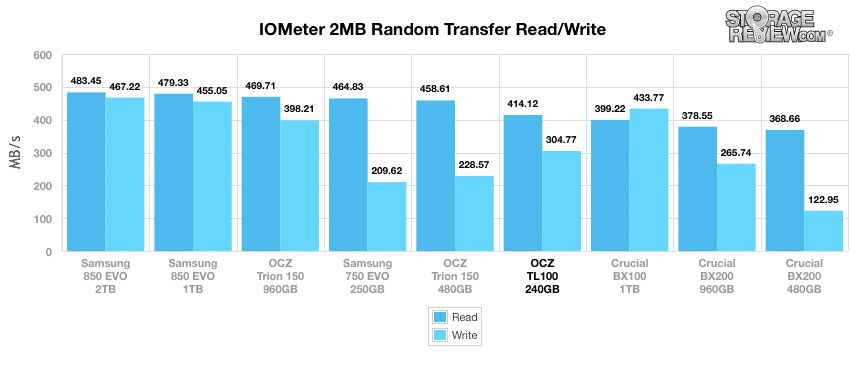
Switching to smaller 4K random transfers, the TL100 began to lag behind the other drives a bit farther. The TL100 gave us a read speed of 29.47MB/s and a write speed of 80.81MB/s. It wasn’t at the bottom of the pack in either score, but it was close.
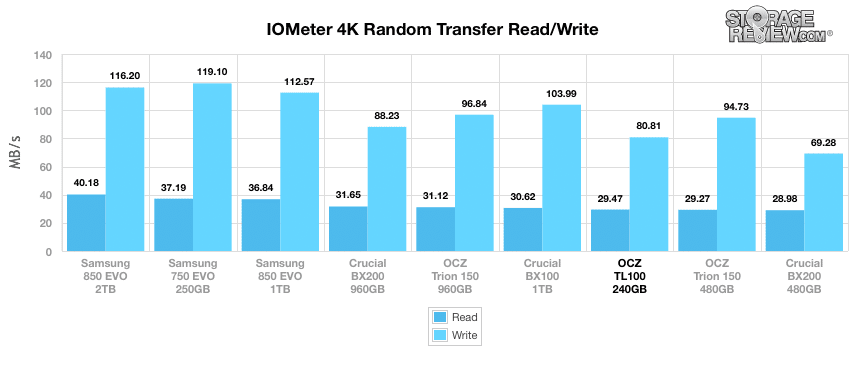
When looking at 4K random throughput, the TL100 once again finds itself on the lower end of the scale with a write throughput of 20,687 IOPS and a read throughput of 7,545 IOPS.
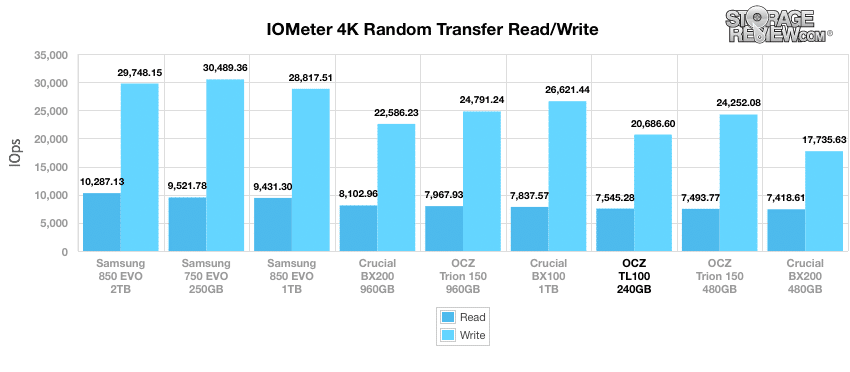
When looking at 4K latency, the TL100 had an average latency a little on the high end (0.048ms) with only the BX200 480GB being higher. Max latency was also a tad high (72.13ms) but much lower than the BX200 drives that were over 100ms higher than the TL100.
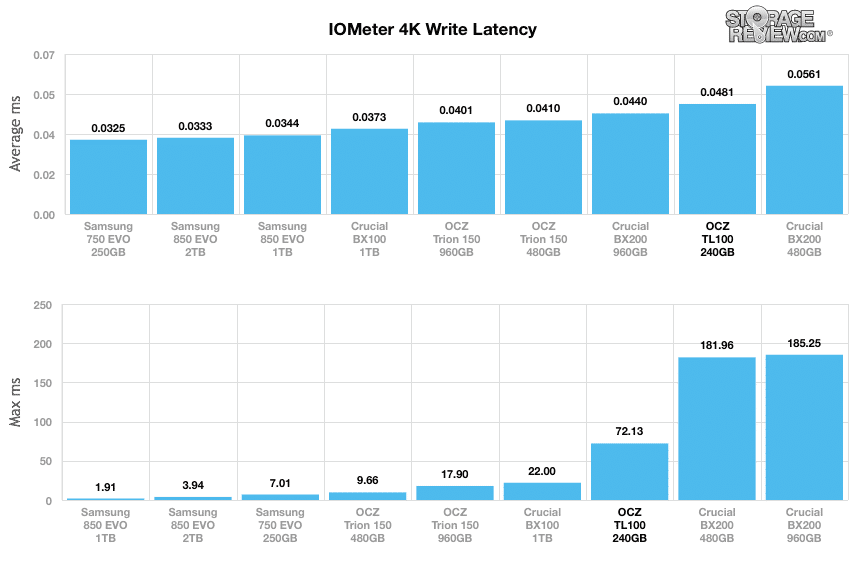
Our next test shifts to a workload with 100% write activity that scales from 1QD to 64QD. In this scenario, the TL100 finished about in the middle of the pack, peaking at about 72K IOPS before settling around 63K IOPS.
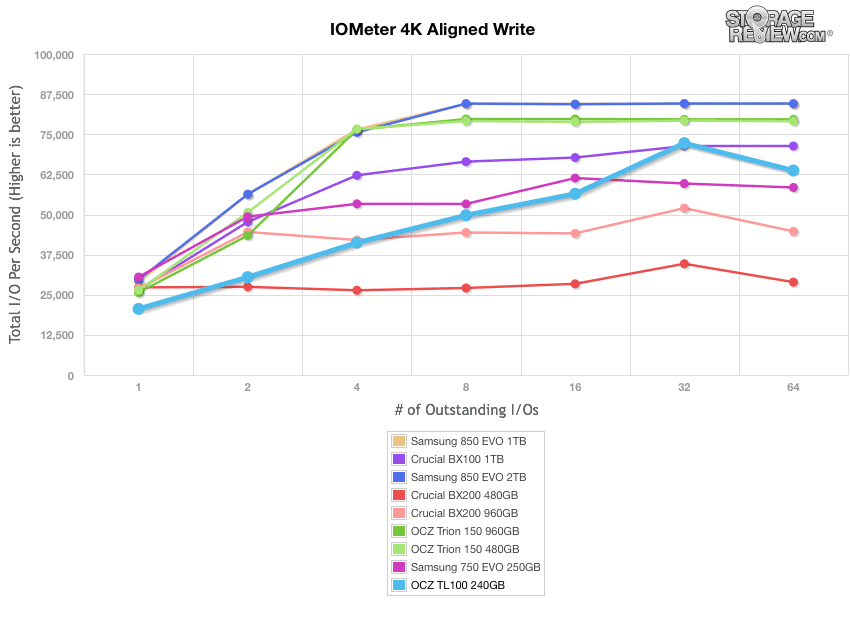
Shifting focus to a 100% read activity, the TL100 gave a slightly better performance coming in fourth overall with around 84K IOPS.
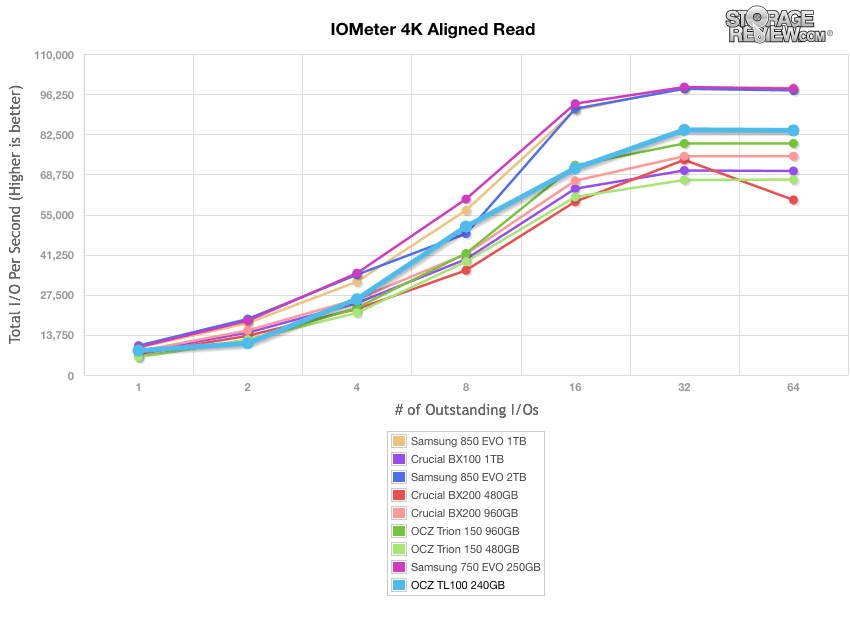
Our final consumer-synthetic benchmarks compare the drives in a series of mixed-server workloads with a queue depth of 1 to 128. Each server profile has a strong bias towards read activity, ranging from 67% read with the database profile to 100% read in the web server profile.
The database profile features a 67% read and 33% write workload, focusing on transfers around 8K in size. Here, the TL100 settled in near the bottom of the pack, finishing off around 27K IOPS.
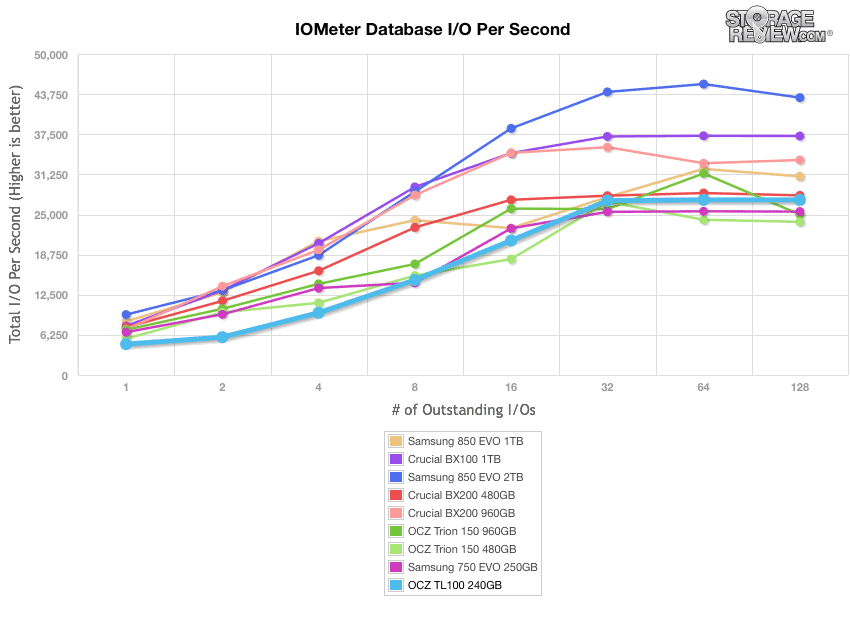
Our next benchmark is the read-only web-server profile, which uses transfer sizes ranging from 512 bytes to 512KB. In this scenario, the TL100 placed about the same as above, finishing around 18K IOPS.
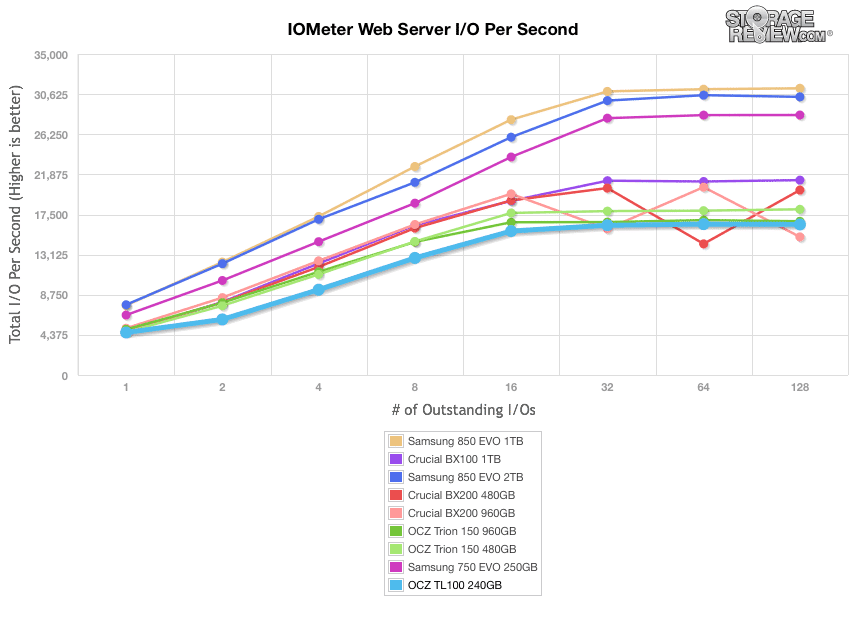
During the file-server profile, which has 80% read and 20% write workload spread out over multiple transfer sizes ranging from 512-bytes to 64KB, the TL100 placed just above last with 15,380 IOPS to the 750 EVO’s 14,902 IOPS.
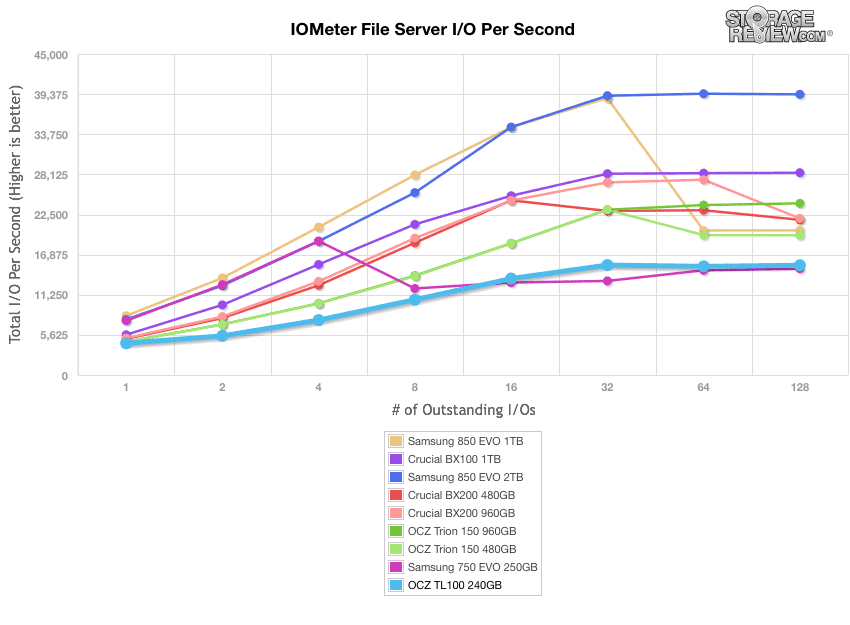
The last profile looks at workstation activity, with a 20% write and 80% read mixture using 8K transfers. Here the TL100 placed last by some margin. The drive started out and stayed last throughout the benchmark, finishing just under 19K.
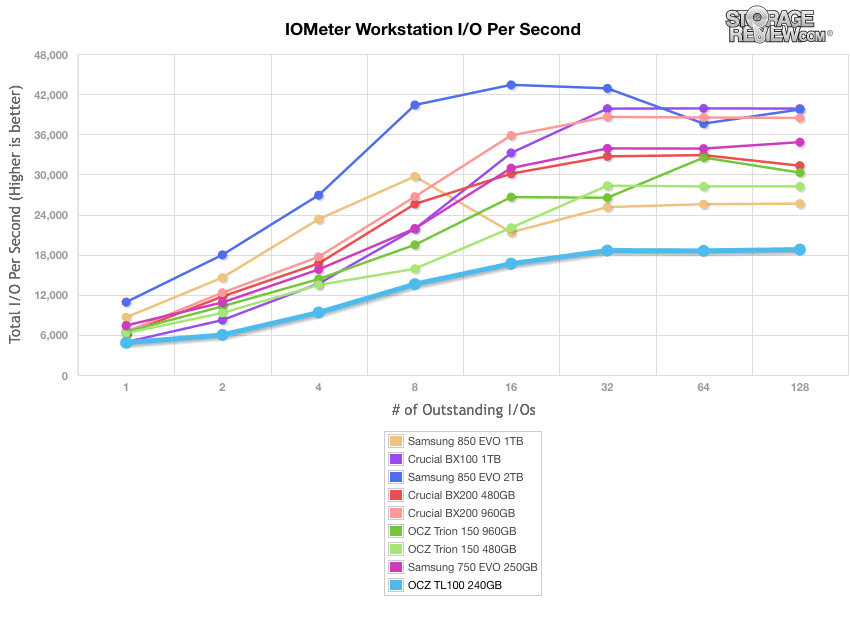
Consumer Real-World Benchmarks
While the results of synthetic benchmarks are important in identifying the key strengths and weaknesses of a drive, performance in these tests does not always translate directly into real-world situations. To get a better idea how the Toshiba OCZ TL100 drive will handle itself in the field, we will chart StorageMark 2010 HTPC, Productivity, and Gaming traces against comparable drives. Higher IOPS and MB/s rates with lower latency times are preferred.
The first trace is based on use as a Home Theater PC (HTPC). The test includes playing one 720P HD movie in Media Player Classic, one 480P SD movie playing in VLC, three movies downloading simultaneously through iTunes, and one 1080i HDTV stream being recorded through Windows Media Center over a 15-minute period.
The TL100 scored 3,672 IOPS, 170.58MB/s, and had a latency of 2.151ms. In all three scores, the drive scored considerably poorer than the rest of the pack.
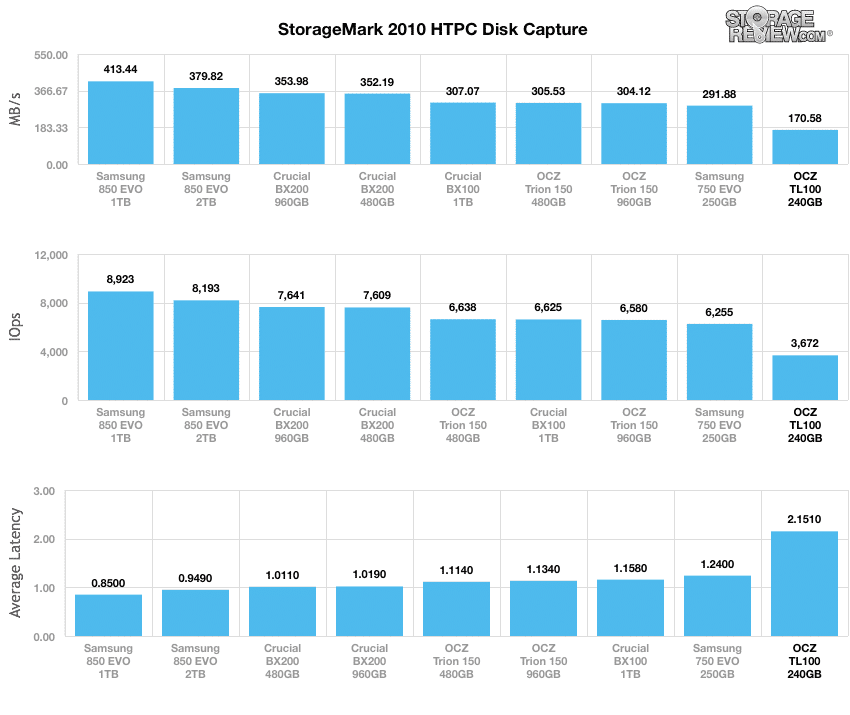
The next trace simulates disk activity in an office workstation or productivity scenario. This test includes three hours of operation in an office productivity environment with 32-bit Windows Vista running Outlook 2007 connected to an Exchange server, web browsing using Chrome and IE8, editing files within Office 2007, viewing PDFs in Adobe Reader, an hour of local music playback, and two hours of streaming music via Pandora.
With our productivity trace the TL100 results were not good. The drive scored 2,081 IOPS, 61.21MB/s, and a latency of 3.82ms. The next closest scores were twice as good in all three aspects.
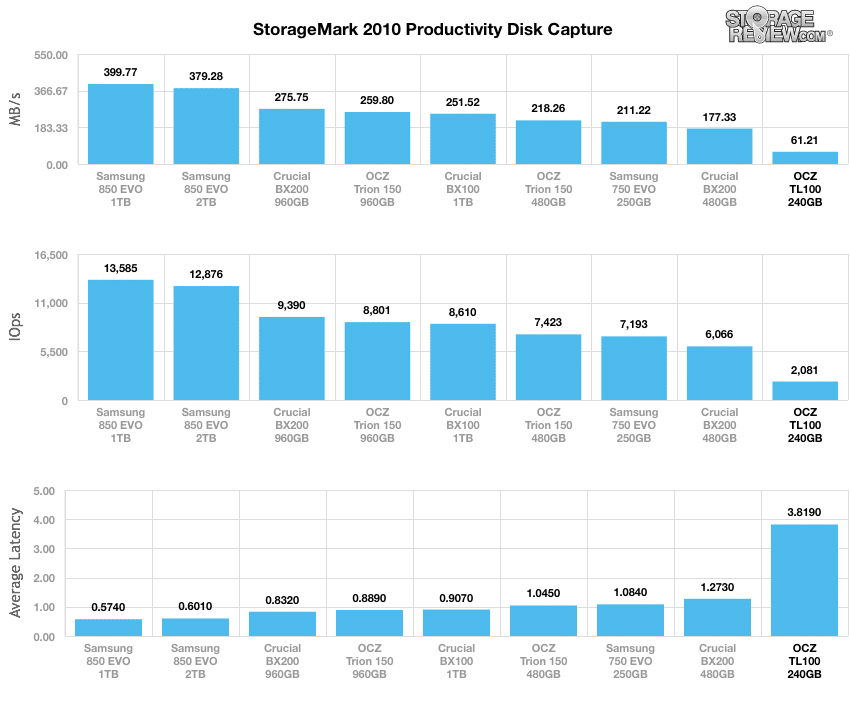
The final consumer real-life benchmark simulates disk activity during gaming. This simulation taxes the drive’s read performance, with 6% write operations and 94% read operations. The test consists of a Windows 7 Ultimate 64-bit system pre-configured with Steam, and with Grand Theft Auto 4, Left 4 Dead 2, and Mass Effect 2 already downloaded and installed. The trace captures the heavy read activity of each game loading from the start, as well as textures as the game progresses.
In our gaming benchmark, the TL100 again came in last place across the board, though there wasn’t such a vast difference in placement as there was with the productivity trace. Here the TL100 scored 5,432 IOPS, 289.37MB/s, and a latency of 1.415ms.
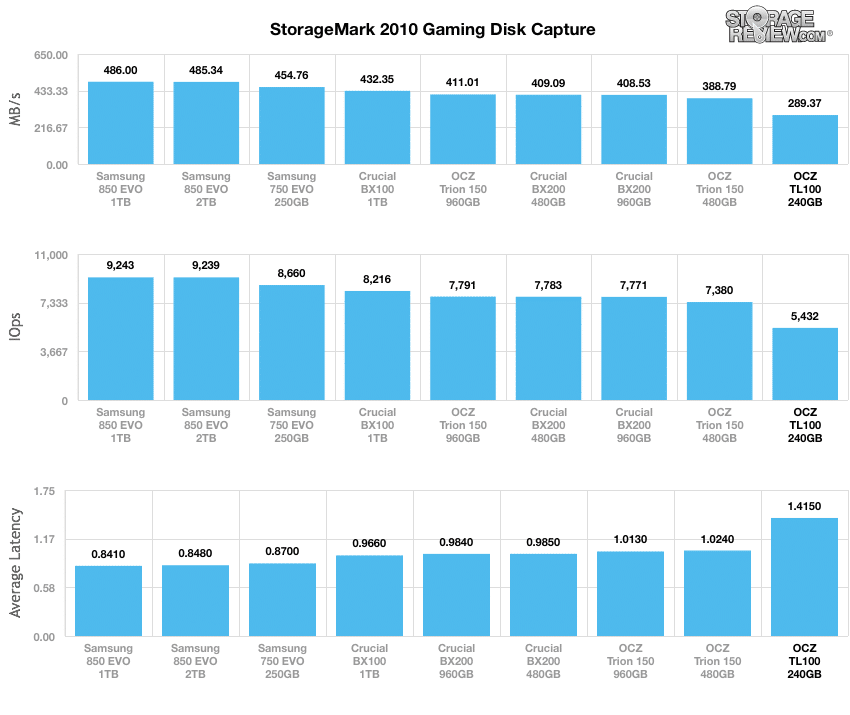
Conclusion
The Toshiba OCZ TL100 is a value 2.5” SSD aimed pretty specifically at replacing HDDs. The drive comes in two capacities: 120GB and 240GB. Instead of marketing the drive against other value SSDs, Toshiba is highlighting the benefits of replacing an HDD with the TL100. The benefits are the usual suspects of faster boot times and overall performance, as well as lower power consumption and longer battery life for notebooks. An attractive feature of the drive is its MSRP of under $50 for the 120GB. This price makes the TL100 one of the cheaper SSDs on the market based on retail price.
With performance, we compared the TL100 to several other value SSDs. The drive did not perform so great against the other value drives, which are generally quite a bit slower than performance models already. While the performance wasn’t great in just about all of our tests, as stated by the company, users would see a fairly big boost against their existing HDDs. In our sequential 2MB IOMeter, the TL100 was able to hit 473.67MB/s read and 440.38MB/s write. In our random 2MB IOMeter, the TL100 was able to hit 414.12MB/s read and 304.77MB/s write. With our 4k tests, the TL100 dropped down in placement against the other drives even more. The TL100 struggled through the 4k benchmarks, floating around the middle to bottom. In our mixed-server workloads, the TL100 stayed near or at bottom.
While the above performance wasn’t terrific, the TL100 really fell on its face in our consumer real-world benchmarks. In all three tests the drive was at the bottom of the pack, and in our productivity trace, it was last by a wide margin. Scores were uncomfortably low to the point where we had to cross reference them against our past HDD and SSHD results to verify it was still faster. Again, we want to note that the drive is a cost-effective, HDD replacement that makes no real performance claims against other SSDs. With that said, outside of an incredible doorbuster sale, it doesn’t take much (about $5-15) to upgrade to a competing drive that offers substantially stronger real-world performance.
Pros
- Very low price
Cons
- Very low performance compared to other SSDs
- Poor consumer real-world performance
The Bottom Line
The Toshiba OCZ TL100 is a low-cost HDD replacement, though may not be the best choice for those looking for a big performance boost.




 Amazon
Amazon